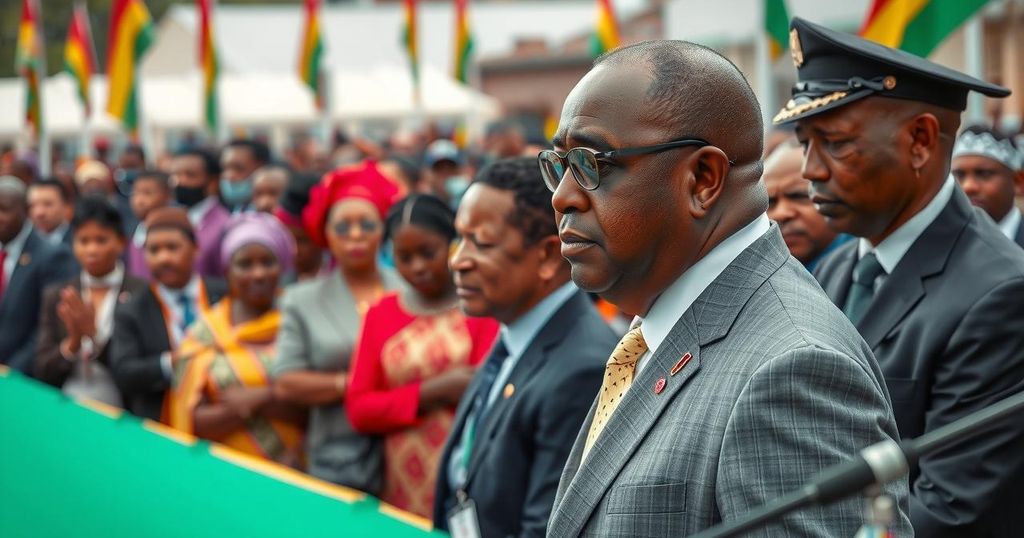Mozambique Inaugurates New President Amidst Political Turmoil and Unrest

Mozambique inaugurated Daniel Chapo as president amid violent post-election protests, where claims of vote rigging have led to over 300 deaths. Chapo pledged to promote national unity, while opposition leader Venancio Mondlane warned of ongoing protests and instability. International observers condemned the elections due to irregularities, raising questions about the new government’s legitimacy.
Mozambique has officially inaugurated its new president, Daniel Chapo, following a tumultuous post-election period marked by violent protests surrounding the electoral results. Chapo, representing the ruling Frelimo party, took his oath on Wednesday amidst heavy security in the capital, Maputo, after the nation witnessed claims from opposition candidate Venancio Mondlane alleging electoral fraud, which have reportedly led to over 300 fatalities. In his inauguration address, Chapo pledged his commitment to national unity and the well-being of the Mozambican populace, stating, “I will devote all my energies to defending, promoting, and consolidating national unity.”
Mondlane, who opposes Chapo’s government and claims the elections were manipulated, has warned of escalating protests that could potentially destabilize the new administration. He has asserted his popularity among the youth and expressed a readiness to engage in protests as a means of opposition against what he characterizes as an unjust regime. Despite security measures and a show of force by the police, the situation remains tense, with analysts predicting unrest as Chapo navigates this complicated political landscape.
International observers have expressed concerns over the electoral process’s integrity, labeling it as marred by significant irregularities. Notably, the European Union has condemned what they described as an “unjustified alteration of election results.” Amidst this backdrop, South African President Cyril Ramaphosa attended the inauguration, while the absence of numerous foreign dignitaries has been interpreted as a lack of recognition of Chapo’s election victory.
In the wake of these developments, Chapo’s forthcoming decisions hold crucial importance in determining the trajectory of national stability. Analysts suggest the possibility of Chapo appointing opposition figures in his cabinet as a gesture towards reconciliation, given the political discord present. As dialogue initiatives have begun with leaders of major political factions, the inclusion of Mondlane remains a contentious point, with Chapo indicating a willingness to consider his participation in future discussions. The unfolding political dynamics in Mozambique will closely depend on Chapo’s approach to governance amid ongoing calls for accountability and reform within the political system.
The political climate in Mozambique has been historically dominated by the Frelimo party, which has maintained power since the country’s independence in 1975. The recent elections on October 9, 2025, were marked by allegations of electoral fraud and violence, leading to significant unrest across the nation. Opposition candidate Venancio Mondlane’s objections to the election results have catalyzed protests, resulting in a tragic loss of life and widespread criticism from international observers. As Mozambique transitions to new leadership under Daniel Chapo, the responses and actions taken by the government will significantly impact both the political stability and the future direction of democracy in the country.
The recent inauguration of Daniel Chapo as the president of Mozambique highlights the ongoing political tensions following disputed elections that have led to widespread unrest and loss of life. As the new president calls for national unity, the opposition led by Venancio Mondlane persists in its claims of fraudulent practices, setting the stage for potential continued civil unrest. Chapo’s decisions regarding cabinet formation and dialogue with opposition figures, particularly Mondlane, will be critical in shaping Mozambique’s path toward stability and democratic governance.
Original Source: www.france24.com







